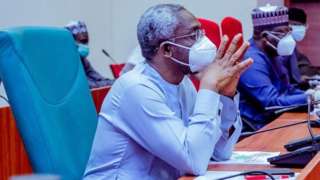There are no products in your shopping cart.
| 0 Items | £0.00 |


NIGERIA'S governors have asked the National Assembly to hold fire on the proposed controversial Infectious Disease Bill which if passed with give the health minister sweeping powers to combat the coronavirus pandemic.
A controversial piece of legislation drafted by the speaker of the Federal House of Representatives Hon Femi Gbajabiamila and two of his colleagues Hon Pascal Obi and Hon Tanko Sununu, the proposed law is officially known as the Control of Infectious Diseases Bill 2020. Its features include allowing the government to confiscate private property and converting them into isolation centres if the need arises.
Many civil society groups have described the bill as too Draconian and opposition to its passing is mounting. It has now emerged that the bill is even scarier than first thought as it will create a new legal framework to replace the National Quarantine Act of 2004 that empowers the federal government to demolish any house, hospital or care home where infected people have stayed.
In addition, the police would be able to arrest any individual suffering from an infectious disease, even without a warrant. Also, with a court order, the government will be able to destroy any building where there is an outbreak of any other infectious disease, including cholera, typhoid and dengue fever.
Furthermore, the bill also proposes introducing compulsory vaccination, with a N500,000 fine and six-month jail term for persons who violate the quarantine restriction or refuse to take vaccinations. To make matters worse, Dr Chikwe Ihekweazu, the director-general of the Nigeria Centre for Diseases Control (NCDC), said he was not involved in drafting the legislation.
After holding a virtual meeting yesterday, the Nigerian Governors Forum (NGF) decided to wade into the crisis, asking federal lawmakers to withhold passing the bill to allow for wider consultations with stakeholders. In addition, the NGF also set up a three-member committee made up of governors Aminu Masari (Katsina), Aminu Tambuwal (Sokoto) and Simon Lalong (Plateau) to meet with the leadership of the National Assembly over the issue.
Governor Kayode Fayemi, the NGF chairman, said: “Following an update from the governor of Sokoto State and the vice chairman of the NGF, Aminu Waziri Tambuwal, on the proposed Control of Infectious Diseases Bill, 2020 introduced by the House of Representatives, governors raised concern with the lack of consultation with state governments who are at the forefront of the epidemic. The forum resolved that the bill should be stepped down until an appropriate consultative process is held, including a public hearing to gather public opinion and concerns.
“In the light of this, the Forum established a committee comprising the governors of Katsina, Sokoto, and Plateau states to lead a consultative meeting with the leadership of the National Assembly on the proposed Control of Infectious Diseases Bill, 2020. The NGF secretariat was also mandated to comprehensively review the bill and its implication on states.”
Also, the governors, who also expressed concerns over the rising cases of the Covid-19 infections across the nation, resolved to among other things, work in collaboration with the Dangote Foundation to set up and train a volunteer health workforce and increase the tempo of setting up isolation centres. They also resolved to make available additional warehouses to store palliatives donated by the private sector and ensure that such donations get to the most vulnerable in each state.
After receiving a briefing from Edo State governor, Godwin Obaseki, the governors also resolved to strengthen on the operation of the World Bank States Fiscal Transparency, Accountability and Sustainability ]project which is supporting a strong pro-poor fiscal response to mitigate the impact of the Covid-19 pandemic. They also agreed to take additional measures to strengthen their public financial management systems, including a revision of their 2020 budgets and the amendment of state procurement guidelines to support e-procurement and the participation of small and medium-sized enterprises.